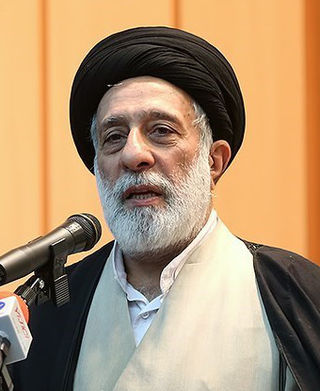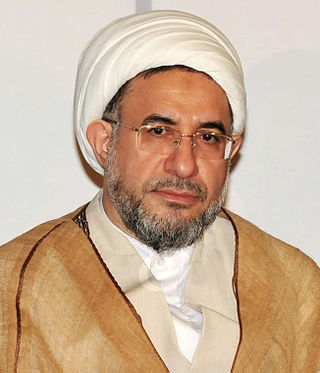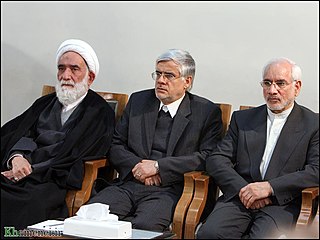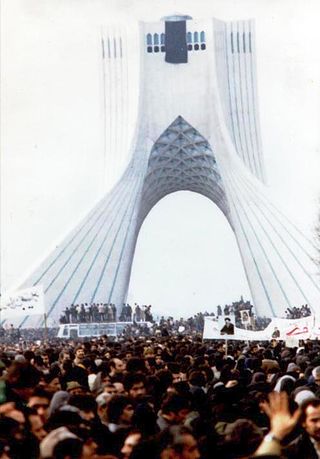
The Iran hostage crisis was a diplomatic standoff between the United States and Iran. Fifty-two American diplomats and citizens were held hostage after a group of militarized Iranian college students belonging to the Muslim Student Followers of the Imam's Line, who supported the Iranian Revolution, took over the U.S. Embassy in Tehran and took them as hostages. The hostages were held for 444 days, from November 4, 1979 to their release on January 20, 1981. The crisis is considered a pivotal episode in the history of Iran–United States relations.

The Expediency Discernment Council of the System is an administrative assembly of Iran appointed by the Supreme Leader and was created upon the revision to the Constitution on 6 February 1988. It was originally set up to resolve differences or conflicts between the Majlis and the Guardian Council, but "its true power lies more in its advisory role to the Supreme Leader." According to Hooman Majd, the Leader "delegated some of his own authority to the council—granting it supervisory powers over all branches of the government" following President Mahmoud Ahmadinejad's election in 2005.

Abdollah Noori is an Iranian cleric and reformist politician. Despite his "long history of service to the Islamic Republic," he became the most senior Islamic politician to be sentenced to prison since the Iranian Revolution, when he was sentenced to five years in prison for political and religious dissent in 1999. He has been called the "bête noire" of Islamic conservatives in Iran.
Special Clerical Court, or Special Court for Clerics is a special Iranian judicial system for prosecuting crimes, both ordinary and political, committed by Islamic clerics and scholars. The Special Clerical Court can defrock and disbar Islamic jurists, give sentences of imprisonment, corporal punishment, execution, etc. The court functions independently of the regular Iranian judicial framework, with its own security and prison systems, "generally secret and confidential" cases, proceedings and procedures, and is accountable only to the Supreme Leader of Iran,. The most senior Islamic politician to be prosecuted and sentenced to prison since the Iranian Revolution was Abdollah Nouri who was sentenced to five years in prison for political and religious dissent by the court in 1999.

Sayyid Mahmoud Hashemi Shahroudi was an Iranian Twelver Shia cleric and conservative politician who was the Chairman of the Expediency Discernment Council from 14 August 2017 until his death on 24 December 2018. He was previously the Chief Justice of Iran from 1999 to 2009.

Ebrahim Yazdi was an Iranian politician, pharmacist, and diplomat who served as deputy prime minister and minister of foreign affairs in the interim government of Mehdi Bazargan, until his resignation in November 1979, in protest at the Iran hostage crisis. From 1995 until 2017, he headed the Freedom Movement of Iran. Yazdi was also a trained cancer researcher.

Mohammad Yazdi was an Iranian conservative and principlist cleric who served as the head of Judiciary System of Iran between 1989 and 1999. In 2015, he was elected to lead Iran's Assembly of Experts, defeating Akbar Hashemi Rafsanjani, a former president, by a vote count of 47 to 24.

The Association of Combatant Clerics is an Iranian reformist clerical political party. It is regarded as a left-wing party within the Iranian political spectrum.

Mohammad Reyshahri, also known as Mohammad Mohammadi-Nik, was an Iranian politician and cleric who was the first Minister of Intelligence, serving from 1984 to 1989 in the cabinet of Prime Minister Mir-Hossein Mousavi.

Ghorbanali Dorri-Najafabadi is an Iranian politician and cleric. He is currently a member of the Assembly of Experts and also a member of the Expediency Discernment Council. He was previously the Minister of Intelligence of Islamic Republic of Iran.

Sayyid Mohammad Kazem Shariatmadari, also spelled Shariat-Madari, was an Iranian Grand Ayatollah. He favoured the traditional Shiite practice of keeping clerics away from governmental positions and was a critic of Supreme Leader Ruhollah Khomeini, denouncing the taking hostage of diplomats at the US embassy in Tehran.

Sayyid Hadi Khamenei is an Iranian reformist politician, mujtahid and linguist. He is a key member of the reformist Association of Combatant Clerics, and a former deputy of the Majlis of Iran representing a district in Tehran.

Mohsen Araki is an Iranian scholar, cleric, university lecturer and politician. He is currently a member of the Assembly of Experts and also a member of the Expediency Discernment Council. He is a prominent Iranian scholar and one of the students of the Islamic thinker Mohammad Baqir al-Sadr.

Ebrahim Asgharzadeh is an Iranian political activist and politician. He served as a member of the 3rd Majlis from 1988–1992 and as a member of the first City Council of Tehran from 1999–2003. His career in politics started as one of the leaders of the group Muslim student followers of the Imam's line that took over the American embassy and held American embassy staff hostage for 444 days.

Hojatoleslam Ruhollah Hosseinian was an Iranian principalist politician.

Ayatollah Mohammad Reza Tavassoli (1931–2008) was an influential Iranian theologian, reformist politician, and a close associate of Ayatollah Ruhollah Khomeini.Tavassoli was a member of the Expediency Discernment Council of the Islamic Republic of Iran. He belonged to the Militant Clerics League. Ayatollah Tavassoli simultaneously held a seat in the 3rd Assembly of Experts.

This article is a timeline of events relevant to the Islamic Revolution in Iran. For earlier events refer to Pahlavi dynasty and for later ones refer to History of the Islamic Republic of Iran. This article doesn't include the reasons of the events and further information is available in Islamic revolution of Iran.
Following the Iranian Revolution, which overthrew the Shah of Iran and his regime, in February 1979, Iran was in a "revolutionary crisis mode" from this time until 1982 or 1983 when forces loyal to the revolution's leader, Ayatollah Ruhollah Khomeini, consolidated power. During this period, Iran's economy and the apparatus of government collapsed; its military and security forces were in disarray.
Salam was a daily newspaper published in Tehran, Iran. It was named by Ahmad Khomeini, the son of Ayatollah Khomeini. It was highly influential in the country during its brief existence from 1991 to 1999 and was one of the early reformist dailies published following the Islamic revolution in Iran.

On 8 January 2017, Akbar Hashemi Rafsanjani, the fourth President of Iran and the country's Chairman of Expediency Discernment Council, died at the age of 82 after suffering a heart attack. He was transferred unconscious to a hospital in Tajrish, north Tehran. Attempts at cardiopulmonary resuscitation for more than an hour trying to revive him were unsuccessful and he died at 19:30 local time (UTC+3:30).

















